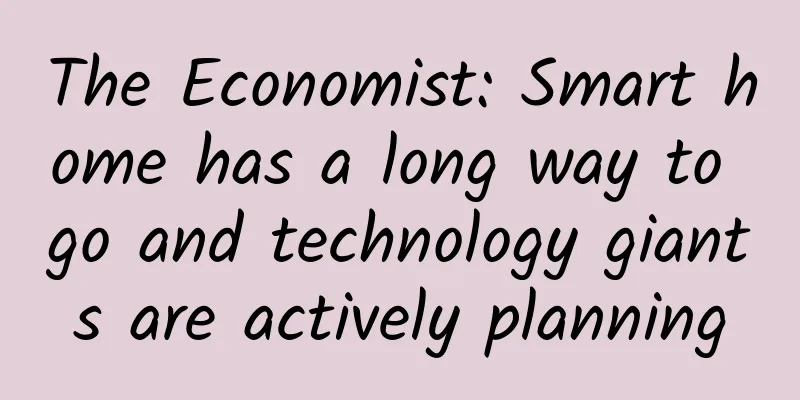The Economist: Smart home has a long way to go and technology giants are actively planning

|
The latest issue of the British magazine "The Economist" wrote that although the smart home field faces many development obstacles in the short term, technology giants are still actively deploying this technology because they are optimistic about its long-term development prospects. The following is the full text of the article: The Internet of Things refers to the addition of sensors and Internet access to everyday objects to form a network. Analysts have been predicting for several years that the Internet of Things will bring huge changes to our daily lives, just like the mobile Internet. Relevant manufacturers have been paying attention to the smart home field and strongly recommend various products, including coffee pots that automatically start when the alarm goes off, lights and curtains that automatically adjust according to different times of the day, and smart refrigerators that send reminders when the milk is about to run out. But so far, most consumers are reluctant to upgrade their home products to smart ones. This is not for lack of investment. Technology companies have invested heavily in connecting everyday objects to the Internet. Google ( Weibo ) has made its intention to enter the smart home field clear in 2014, when it spent $3.2 billion to acquire smart thermostat manufacturer Nest and $550 million to acquire home surveillance camera manufacturer Dropcam. Nest later absorbed Dropcam and has become the most well-known smart home brand. However, how long it will take for this technology to enter the mainstream market is quite worrying. Nest has clearly disappointed Google. According to market research firm Strategy Analytics, the company sold 1.3 million smart thermostats in 2015 and only 2.5 million in total over the past few years. In recent years, the company has focused on redesigning existing products rather than introducing new ones. Perhaps because of this, Nest founder and CEO Tony Fadell stepped down on June 3 to become an advisor to Google's parent company Alphabet. Fadell was once an Apple executive and the "father of the iPod," but he failed to work his magic in the smart home field. Nest's problems are typical. Frank Gillett, an analyst at market research firm Forrester, said that only 6% of American households have smart home devices, including Internet-enabled appliances, home monitoring systems, speakers and lighting devices. Rapid growth in this area may be difficult to achieve: the penetration rate is expected to be only more than 15% by 2021. Few consumers believe that the Internet will play a major role in everyday devices. A survey conducted by PricewaterhouseCoopers in the UK found that 72% of respondents were not prepared to use smart home technology in the next two to five years, and they were unwilling to pay for it. Last year, global consumers spent about $60 billion on smart home hardware and services, a far cry from the total expenditure on stand-alone devices. There are several important reasons for this bleak outlook. Companies have an incentive to embrace the Internet: installing sensors in equipment and factories can save money, and they can analyze data to improve efficiency. Adam Sagar of Canary, a developer of home smart cameras, said that in comparison, many people buy home smart devices just for fun, not as a necessity. A lot of smart hardware is still too expensive. Samsung's smart refrigerator has a built-in camera that can check if food is rotting inside and help consumers know which ingredients to buy through a smartphone app during shopping. But this product costs as much as $5,000, and people who can afford it probably won't shop for themselves. In addition, the frequency of updates to home appliances such as refrigerators is very low, which has slowed the popularity of new devices. In addition, the technology is still not perfect. Jamie Siminoff, CEO of Ring, a remote doorbell startup, said that as a communication bridge between smart home devices and consumers, smartphones have raised consumers' expectations. After long-term use of smartphones, consumers have become accustomed to high-quality seamless user experience, but current smart home devices are still difficult to achieve this level. Not only that, due to the lack of unified standards, manufacturers' devices cannot exchange data with each other. There are exceptions, and many devices that are easy to install and provide clear benefits have become popular, including motion sensors that send alerts when doors and windows are opened, and cameras that monitor home activity. Devices such as smoke detectors are already used in home life because insurance companies have enough incentive to use such products. The smart home field is very active because startups and large companies are betting that consumer hesitation is only temporary. But consumer apathy has forced companies to start rethinking the development model of smart home. Perhaps the biggest surprise came from Amazon , which, despite its stumbles in the smartphone market, has carved out a new niche in the smart home. The Amazon Echo smart speaker recognizes and responds to voice commands. It can also provide information such as weather forecasts and sports scores, play music and turn lights on and off. The device, which costs about $180, has not yet become a best-seller. Amazon does not disclose sales figures, but market research firm Strategy Analytics estimates that fewer than 1 million Echo units have been sold since it went on sale in November 2014. But the Echo has become the talk of Silicon Valley. Talk to home appliances Voice interfaces can overcome the fragmentation problem faced by the smart home field and become a standard integrator of various smart home hardware. Echo has been opened to external developers, allowing them to integrate various devices and services with Echo. The success of Echo may be unexpected, but competitors have found that smart speakers may become an extremely important device. Google announced that it will develop a standalone smart hub device similar to Echo. This product, called Google Home, will also rely on voice commands. Apple is also expected to release new smart home features. Rumor has it that the company will release a standalone smart home hub similar to the Echo at its annual developer conference on June 13. The company's smart home platform HomeKit has not been successful so far. Despite its large and wealthy user base, Apple has not yet cracked the smart home field. Geoff Blaber, an analyst at mobile industry information company CCS Insights, believes that this is enough to show how difficult this business is. For different purposes, each technology giant hopes to dispel consumers' doubts and deeply integrate their own technology into users' home life. Echo can help Amazon better understand users' time allocation patterns and simplify their shopping process by recommending products. Google, which focuses on advertising, also hopes to obtain new data from it and deepen its understanding of users as much as possible in order to deliver more accurate advertisements. Apple, which has always been known for its simplicity and ecosystem, also hopes that users can use their devices as a portal to organize their daily lives. If the tech giants still insist on developing smart homes, the source of profits will also become a major uncertainty. "It's not clear what kind of smart home economic model will work," said Andy Hobsbaum of Evrythng, an Internet of Things platform. Some companies hope to make enough profit through hardware, while others try to generate income by charging service fees in addition to selling equipment. Smart home devices are diverse, not only very personal, but also very durable. This has also prompted many companies to deploy in this field-but this technology can only usher in spring when consumers really open their arms. As a winner of Toutiao's Qingyun Plan and Baijiahao's Bai+ Plan, the 2019 Baidu Digital Author of the Year, the Baijiahao's Most Popular Author in the Technology Field, the 2019 Sogou Technology and Culture Author, and the 2021 Baijiahao Quarterly Influential Creator, he has won many awards, including the 2013 Sohu Best Industry Media Person, the 2015 China New Media Entrepreneurship Competition Beijing Third Place, the 2015 Guangmang Experience Award, the 2015 China New Media Entrepreneurship Competition Finals Third Place, and the 2018 Baidu Dynamic Annual Powerful Celebrity. |
<<: The IP derivatives market is booming: is it a blue ocean or a bubble?
>>: The tangled emotional entanglement between iOS and Android may determine the winner
Recommend
The Door of True Love "Soul Healing" Baidu Cloud Download
Introduction to the resources of True Love's ...
Writing testable JavaScript code
Whether we use a testing framework like Mocha or ...
Leonardo da Vinci and Michelangelo, who is the greatest Italian artist? | Yihai Shizhen
What would happen when two top art masters, Leona...
What are the basic functions of Zhongshan WeChat catering mini program and the function list of the catering mini program?
Why do many catering companies now choose to deve...
One article to understand brand overseas marketing
When the growth rate of domestic traffic and demo...
How does a girl solve the problem when she wants something special? What do you want to do?
A: Condition analysis: Hello: This is considered ...
Brand marketing trends in 2020!
2019 has passed by quickly, but it has left many ...
This year, the pension level for retirees will be increased by 4%! How to adjust specifically? Attached is the latest notice of 2022 adjustments!
Not long ago, my country launched the individual ...
Is goose down better than duck down? Don’t choose the goose over the duck when choosing down jackets!
Audit expert: Wang Lei National Parks and Conserv...
How did Meilishuo become a dark horse in entertainment marketing?
In a world where time is fragmented and consumer ...
Has Taobao's "QuA" revolutionized online travel?
Taobao gave birth to another son, named "QuA...
Battery and memory have once again become Google's development focus?
[[135145]] As we all know, Google I/O conference ...
Lao Jiang's "First-line Upgrade" advanced class's latest handicap is a new trick to achieve the secret of being one step ahead
Lao Jiang's "First-line Upgrade" Ad...
SEM | Click is a technology, conversion is an art, why do we say that?
Over the past few decades, the rapid and innovati...
Substitutable and non-disruptive innovation: Apple doesn’t need to acquire GoPro and Tesla
Recently, some foreign analysts suggested that Ap...









